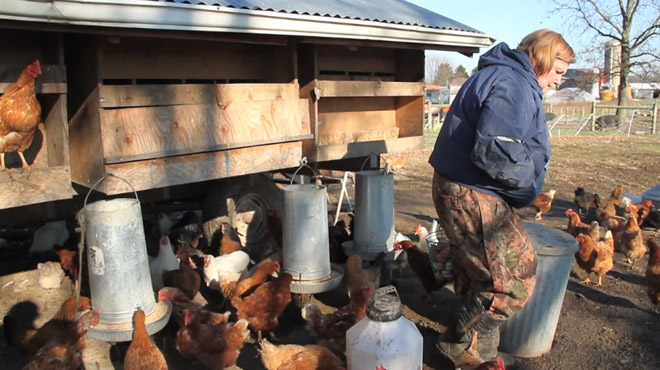By Rich Heidorn Jr.
Maggie Henry, a 61-year-old organic farmer from Western Pennsylvania, never expected to become a protester.
“I was happy working like a mule to produce food for my community,” she said.
Her 100-acre farm in Bessemer, near the Ohio border, produced eggs, meat and vegetables for top restaurants in Pittsburgh, including the Fairmont Hotel, the Enrico Biscotti cafe and Crested Duck Charcuterie. Over four years it grew from six to 400 chickens. “I had a thriving business going! It was all I could handle,” she said.
But after a shale gas operation began drilling in a neighboring farm in 2010, she says, her life changed.
Her farm, which has been in her family for almost a century, is located above an historic oil field. Plugged wells can serve as pathways for methane and other pollutants, allowing them to seep to the surface and into aquifers.
She has a monitor that measures particulate matter that is “off the charts all the time.”
“The toxicity of the air and the contamination of the water is absolutely unbelievable,” she said. “People are covered with rashes and blisters. They experienced all sorts of neurotoxic symptoms. Their children suffer nose bleeds and asthmatic reactions.”
She blames drilling in the Utica shale for a series of earthquakes in March 2014 that she says cracked her basement foundation, drywall and chimney pipe. “When it rains, water pours through my basement wall,” she said. “That never happened before.”
In February, two pigs and a cow unexpectedly died within two and a half weeks of each other.
A year ago, she told her story in a documentary. And on May 14, she traveled to D.C. to attend the Federal Energy Regulatory Commission’s open meeting, becoming one of three protesters to evade a security dragnet and enter the meeting room. (See Another Meeting Day, Another Drama at FERC.)
She stood up at the end of the session, shouting “In the shale plays of Pennsylvania, you are killing people!”
She mentioned Terry Greenwood, a farmer who she said “made a chilling prediction years ago. He said, ‘First it is the animals, then it will be the people.’ We buried him in June of last year, the victim of a rare form of brain cancer,” she said.
After the FERC meeting, Chairman Norman Bay called the protesters’ repeated interruptions of the commission’s meetings “disrespectful” and noted that it is the states — not FERC — that regulates fracking.
Henry insists FERC shares responsibility because it has approved liquefied natural gas export terminals. “They are poisoning us so they can make more money selling this fracked gas overseas,” she said. “No way am I going to permit this. I intend to give voice to the struggle every chance I get.”
She stopped farming her land after the 2013 harvest, no longer able to guarantee that her products were pure.
“I don’t care about anything [else] anymore,” she said Tuesday morning, shortly before marching to FERC headquarters again with other protesters. “I have been radicalized.”
(See related story, Meet the People Making Life a Little More Difficult for FERC this Week.)




